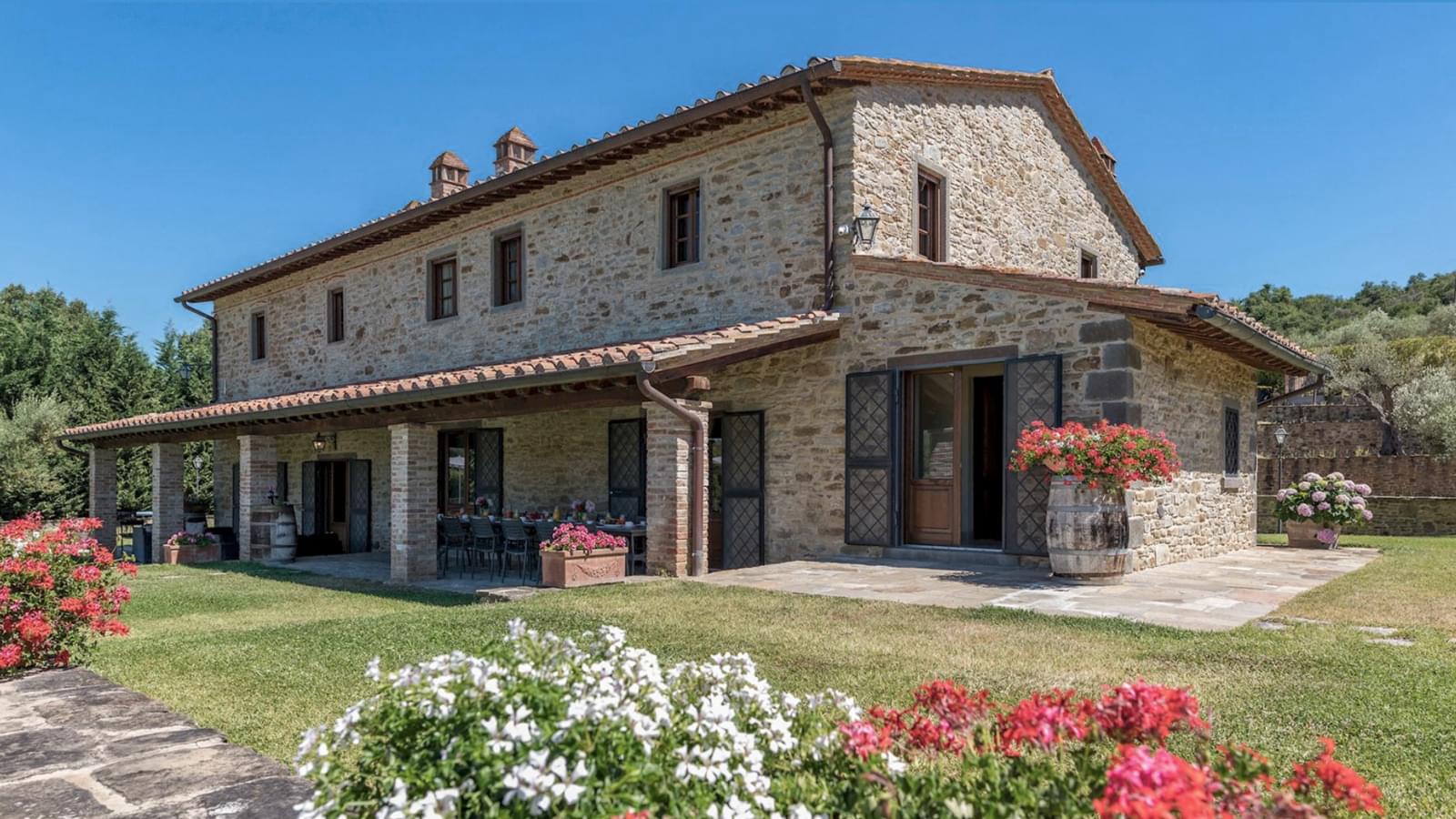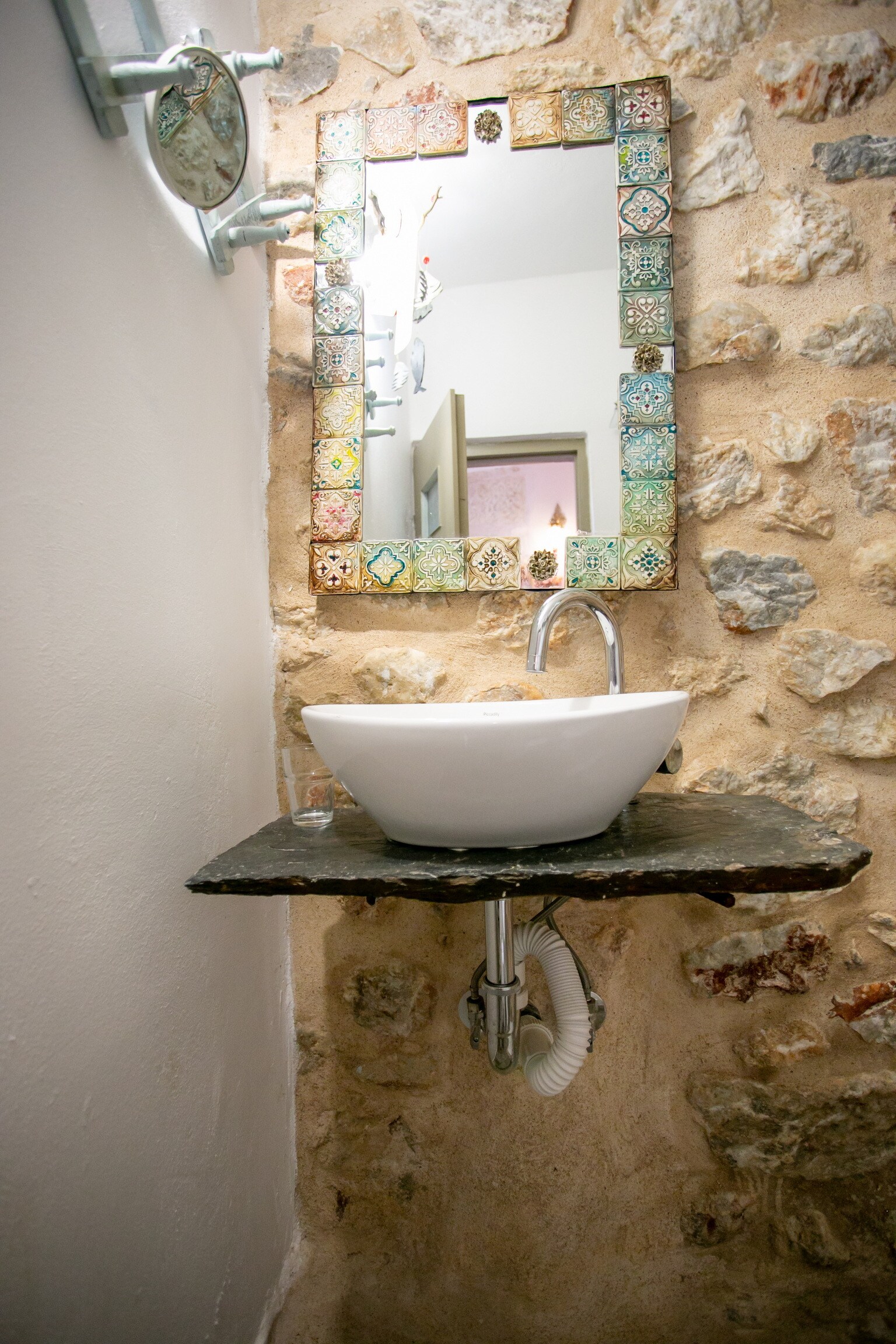Peloponnese Vacation Rentals
Explore 286 rental homes and villas in Peloponnese for your next vacation or business travel. With private vacation home rentals, enjoy a more personalized stay and a wide range of amenities such as Homes with Pools, Air Condition Homes and Best Affordable Homes. With a wide range of homes to offer, pricing can start as low as $40 per night with homes containing as many as 12 bedrooms and 12 bathrooms. However you're looking to experience your stay, Homes and Villas by Marriott has your next vacation home waiting.
Types of vacation rentals in Peloponnese
Available properties in Peloponnese
Get to know Peloponnese, Greece
Here are some things to know to support your visit:
Peloponnese Overview
Immerse yourself in the enchanting Peloponnese, a southern Greek peninsula that is a symphony of historical grandeur, mythological wonders, and breathtaking natural beauty. This storied region is not just a backdrop for tales of gods and heroes but a vibrant canvas where the past and present coalesce into an unforgettable experience.
At the heart of the Peloponnese's allure are its legendary historical sites. The ancient city of Olympia stands as a testament to the enduring spirit of the Olympic Games. Here, amidst the hallowed ruins of the original stadium and temples, you can almost hear the echoes of ancient athletes striving for glory. The Archaeological Museum of Olympia is a treasure trove, showcasing exquisite artifacts that bring the richness of Greek civilization to life.
Venture to the imposing citadel of Mycenae, where the echoes of King Agamemnon's rule still resonate through the Lion Gate and into the depths of his majestic tomb. These ancient stones whisper stories of power and intrigue that have captivated the imagination for millennia.
Ascend to the medieval city of Mystras, a UNESCO World Heritage Site, where Byzantine history is etched into every church, palace, and monastery. From the commanding heights of its castle, the tapestry of the Peloponnese unfolds in panoramic splendor.
The region's natural beauty is a siren's call to the adventurous. The Mani Peninsula, with its craggy mountains and serpentine coastline, invites exploration, while the ethereal Diros Caves beckon with their subterranean waterways and geological marvels.
The Peloponnese is also a haven for beach lovers. The sun-kissed shores of Kalamata and the sparkling waters of the Messinian Gulf offer a paradise for swimming, sunbathing, and water sports. The allure of the sea is matched only by the region's culinary reputation, with Kalamata's olives and vibrant food scene tantalizing the taste buds of gourmands.
For a truly immersive and intimate experience, consider the luxury of renting a private home. Imagine waking up in your own slice of Greek paradise, perhaps with a swimming pool that mirrors the azure sky, or a pet-friendly garden where your furry companions can bask in the Mediterranean sun. These homes offer a sanctuary where privacy and comfort are yours alone, allowing you to live like a local and create memories in a space that's uniquely yours.
Nafplio, with its romantic ambiance, neoclassical charm, and lively waterfront, is a jewel in the Peloponnese crown. Stroll along its promenades, dine at quaint tavernas, and feel the pulse of Greek life in this enchanting town.
For the oenophiles, the Nemea region's vineyards are a pilgrimage site for those seeking to savor some of Greece's most exquisite red wines. Engage with local vintners and indulge in tastings that reveal the depth of the region's winemaking heritage.
The Peloponnese is more than a destination; it's a journey through time, a feast for the senses, and a place where every traveler can find their own path to wonder. Whether you're seeking the whispers of history, the embrace of natural splendor, or the simple joy of a secluded home away from home, the Peloponnese awaits to enchant and inspire.
Cultural Attractions in Peloponnese
The Peloponnese, a peninsula in southern Greece, is a destination that offers a rich tapestry of cultural experiences, making it an ideal choice for travelers with a passion for the arts, history, and local customs. This region is steeped in ancient mythology and history, with a landscape dotted with archaeological sites, Byzantine churches, and Venetian fortresses.
Begin your cultural odyssey at the ancient city of Mycenae, a UNESCO World Heritage site. Here, you can explore the ruins of a civilization that flourished over 3,000 years ago, including the famous Lion Gate and the Tomb of Agamemnon. Nearby, the ancient theater of Epidaurus, renowned for its extraordinary acoustics, hosts live performances during the annual Epidaurus Festival, offering a unique opportunity to enjoy Greek drama in an authentic setting.
In the medieval city of Monemvasia, you'll find a living museum perched on a giant rock. Wander through the cobbled streets and explore the old mansions, churches, and the fortress that offer a glimpse into the Byzantine and Venetian eras. The town also hosts cultural events and festivals throughout the year, celebrating local customs and traditions.
Art enthusiasts will find a wealth of Byzantine art and architecture in the region. The city of Mistra, a UNESCO World Heritage site near Sparta, is an open-air museum featuring well-preserved frescoes and buildings from the Byzantine period. The Peloponnese is also home to numerous small galleries and workshops where local artists display their crafts, from ceramics to textiles.
For a deep dive into the region's history, visit the Archaeological Museum of Olympia, which houses artifacts from the site where the Olympic Games were born. The museum's collection includes sculptures, tools, and the famous Hermes of Praxiteles statue.
Live music is an integral part of Peloponnesian culture, with traditional Greek music often heard in tavernas and during local festivals. The Kalamata International Dance Festival brings contemporary dance to the forefront, while the Patras Carnival is a vibrant celebration with parades, balls, and music events.
The Peloponnese also offers a culinary journey through its local customs. Enjoy the region's olive oil, wines, and traditional dishes like moussaka and pastitsio. Participate in a cooking class or wine tasting to truly immerse yourself in the local flavors.
In the Peloponnese, every ancient ruin tells a story, every local festival is a celebration of life, and every piece of art is a reflection of Greece's enduring legacy. It's a destination that not only showcases the grandeur of the past but also embraces the living culture of today.
Family friendly activities in Peloponnese
The Peloponnese in Greece is a treasure trove of adventures for families traveling with children, offering a blend of historical sites, beautiful landscapes, and engaging activities that can captivate the imagination of young minds.
Start your family journey at the ancient ruins of Olympia, the birthplace of the Olympic Games. Children can run on the original Olympic track, igniting their interest in history and sports. The nearby Archaeological Museum of Olympia houses fascinating artifacts that can provide an educational complement to the physical site.
For a taste of medieval history, the fortified town of Mystras near Sparta offers a chance to wander through Byzantine ruins and imagine life in a castle. The town's winding paths and hidden corners are perfect for little explorers.
Beaches are always a hit with kids, and the Peloponnese does not disappoint. Voidokilia Beach, with its perfect omega shape and soft sands, is ideal for a family day out. The shallow waters here are safe for swimming, and the surrounding area is great for a picnic or a game of beach volleyball.
For a unique experience, take a trip to the Diros Caves. These magical underground caves can be explored by boat, where children can marvel at the stunning stalactites and stalagmites, making for an unforgettable adventure.
The Peloponnese is also home to several water parks, such as the Water Village in Zante, where kids can splash around and enjoy a variety of water slides and pools. It's a perfect way to cool off on a hot summer day.
Nature-loving families should not miss the chance to hike in the Lousios Gorge, where the scenery is breathtaking and the trails are suitable for children with a moderate level of fitness. Along the way, you might stumble upon ancient monasteries perched on the cliffs, adding a touch of mystery to your hike.
For a cultural experience, visit the town of Nafplio, one of Greece's most picturesque seaside towns. Here, children can enjoy gelato as they stroll along the promenade, and the Palamidi Castle offers a fun challenge with its 999 steps to the top, rewarding climbers with panoramic views.
The Peloponnese region combines natural beauty with a rich tapestry of history and culture, ensuring that families with children will find both entertainment and education at every turn. Whether it's through exploring ancient ruins, enjoying the great outdoors, or simply relaxing on the beach, there's something for every child to enjoy.
Outdoor activities in Peloponnese
The Peloponnese, a peninsula in southern Greece, is a treasure trove of natural wonders and outdoor activities that cater to the nature enthusiast's soul. With its diverse landscapes, ranging from rugged mountains to serene beaches, and a climate that encourages year-round exploration, the Peloponnese is an outdoor paradise waiting to be discovered.
The region is dominated by the Taygetos and Parnon mountain ranges, which offer a playground for hikers and mountaineers. The Taygetos, in particular, is known for its challenging trails and the awe-inspiring vistas from its highest peak, Mount Taygetos, also known as Profitis Ilias. The Menalon Trail, a certified European hiking route, winds through the Lousios Gorge, ancient monasteries, and quaint stone villages, providing a cultural dimension to your outdoor adventure.
For those drawn to the water, the Peloponnese boasts a stunning coastline with crystal-clear waters. Sea kayaking around the Mani Peninsula allows you to explore hidden coves, sea caves, and secluded beaches. The region is also a prime spot for windsurfing and kitesurfing, with the Gulf of Corinth being a favorite among enthusiasts.
The Peloponnese is also home to the Neda River, one of the few rivers in Greece with a female name, which offers a unique river trekking experience. The journey along the Neda includes swimming through natural pools, walking through lush forests, and marveling at waterfalls, including the famous Neda waterfalls.
For a more relaxed pace, the region's numerous beaches, such as Voidokilia Beach with its perfect omega shape and golden sand, provide a serene setting for sunbathing, swimming, and enjoying the Mediterranean sun. The area is also rich in biodiversity, with the Gialova lagoon near Pylos being one of Europe's most important wetlands and a haven for birdwatchers.
Cyclists will find the Peloponnese accommodating as well, with routes that traverse olive groves, coastal paths, and mountainous terrain, offering both challenge and scenic beauty. The EuroVelo 8, part of the European cycle route network, passes through the region, making it an attractive destination for long-distance cyclists.
Lastly, the Peloponnese is dotted with ancient ruins and historical sites, such as Ancient Olympia, the birthplace of the Olympic Games, and the imposing fortress of Mystras, which provide a fascinating backdrop to the natural beauty of the region. These sites offer a unique opportunity to combine outdoor activities with a touch of history, making the Peloponnese a well-rounded destination for those who love to explore the great outdoors.
Weather in Peloponnese
The Peloponnese, a peninsula in southern Greece, is a region steeped in history and natural beauty, offering a climate that is as varied as its landscapes. The weather here is typically Mediterranean, with hot, dry summers and mild, wet winters, making it a year-round destination for travelers seeking both cultural experiences and outdoor adventures.
Summer, from June to August, is characterized by high temperatures often climbing above 30°C (86°F). The heat is usually tempered by the meltemi, a seasonal northerly wind that provides a refreshing breeze, particularly along the coast. Humidity is relatively low, making the heat more bearable, and rainfall is scarce, which is perfect for beach-goers and those looking to explore ancient ruins without the interruption of rain.
Autumn, from September to November, sees a gradual decrease in temperature, with averages ranging from 20°C to 25°C (68°F to 77°F). This season is considered one of the best times to visit the Peloponnese, as the weather remains warm enough for swimming and outdoor activities, but the peak tourist crowds have dissipated. The landscape begins to transform with the changing leaves, and the first rains refresh the parched summer earth.
Winter, from December to February, brings cooler weather, with temperatures ranging from 5°C to 15°C (41°F to 59°F). The region experiences the majority of its annual rainfall during this period, which can make for some wet days, but also ensures that the countryside is lush and green. Snow is rare in the lowlands but can be found in the mountainous areas, offering a different kind of beauty and occasionally opportunities for winter sports.
Spring, from March to May, is a delightful time to visit as the weather warms up, with temperatures ranging from 15°C to 20°C (59°F to 68°F). The countryside is in full bloom, and the weather is ideal for hiking, sightseeing, and experiencing local festivals. Rainfall decreases as the season progresses, leading to more sunny days and the reemergence of outdoor cafés and tavernas.
The most popular weather conditions, with warm temperatures and little rainfall, are prevalent from late spring to early autumn. The months of May, June, and September are particularly pleasant, offering a perfect blend of comfortable temperatures, fewer crowds, and the natural beauty of the Peloponnese in full display. Whether you're exploring the ancient sites of Olympia and Mycenae or enjoying the stunning beaches and charming villages, the Peloponnese offers a climate that complements its rich cultural tapestry and diverse natural attractions.
Transportation in Peloponnese
The Peloponnese, a peninsula in southern Greece rich in history and natural beauty, offers a variety of transportation options for travelers seeking to explore its wonders. Most visitors arrive by road or sea, with the region being well-connected to Athens and other parts of Greece.
For those arriving by air, the Kalamata International Airport in the southwest and the Araxos Airport near Patras in the northwest serve as gateways to the Peloponnese, offering seasonal flights to and from various European destinations. From these airports, car rental services, taxis, and regional buses are available to transport visitors to their desired locations within the peninsula.
The road network in the Peloponnese is extensive, with modern highways such as the Olympia Odos connecting Athens to Patras, and the Moreas Motorway linking Corinth to Kalamata. These highways make it convenient for travelers to drive around the region. Car rentals are a popular choice for those who wish to explore at their own pace, offering the flexibility to visit remote archaeological sites, mountain villages, and hidden beaches.
Intercity buses, known as KTEL, provide reliable and frequent services between major towns and cities, as well as to smaller villages, making them a cost-effective option for getting around. The rail network is more limited but offers a scenic route from Athens to Patras, with a memorable journey across the iconic Rio-Antirrio Bridge.
For those interested in exploring the coastal areas, ferry services operate from various ports, such as Gythio and Kalamata, to islands like Kythira and Crete, as well as to other parts of the mainland.
The Peloponnese is also a region that invites exploration on foot, particularly in its charming towns and villages. Places like Nafplio, Monemvasia, and the old town of Kalamata are highly walkable, with narrow streets and alleys that reveal their character best when strolled through leisurely. However, due to the region's varied terrain and the distance between major sites, walking as the sole means of transportation is not practical for longer distances.
In summary, the Peloponnese offers a mix of transportation options suitable for different travel preferences. Whether by car, bus, train, or ferry, visitors can navigate the region with ease, while the walkable historic centers provide a delightful way to experience the local culture and heritage up close.










